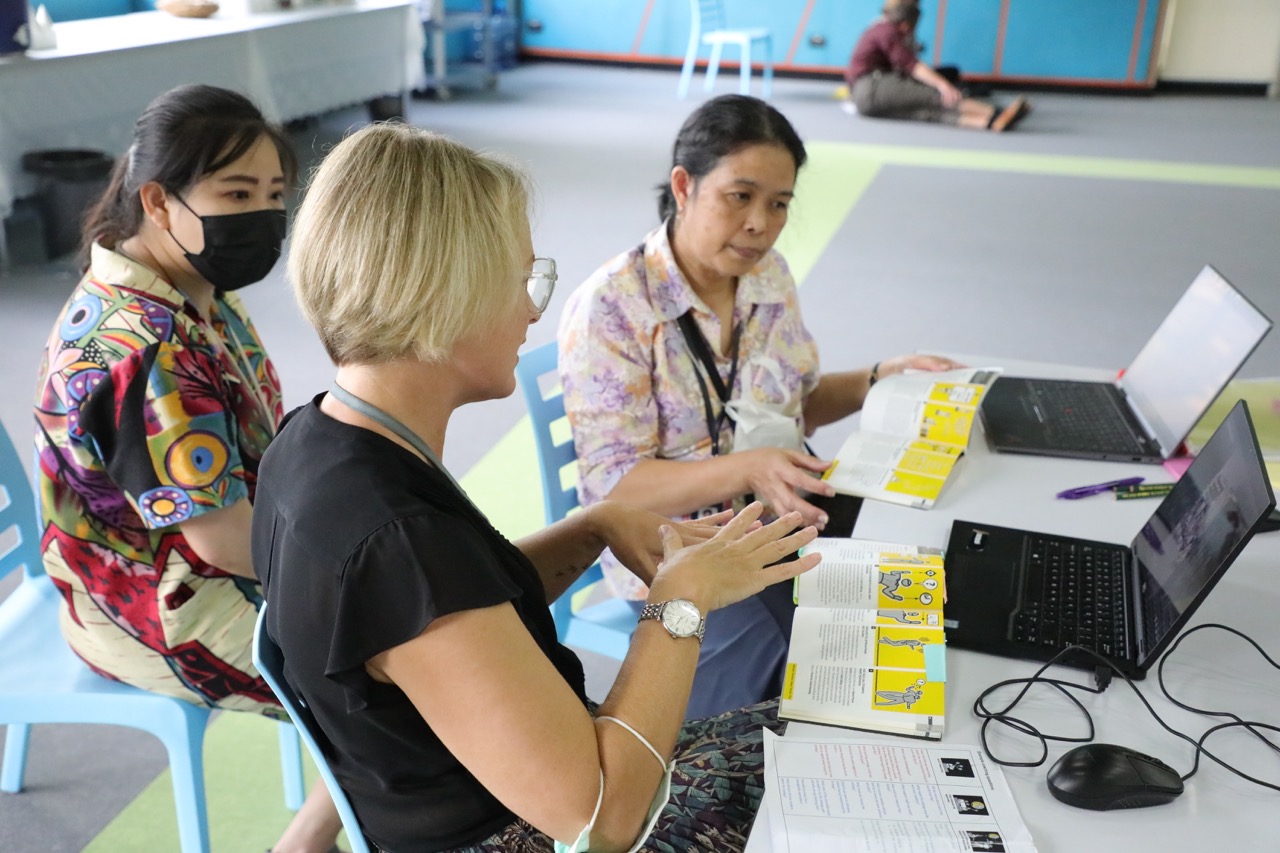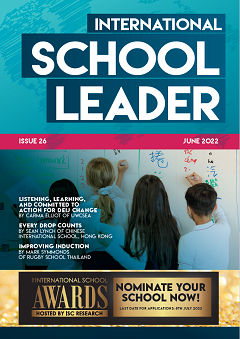By Mark Verde
“You can’t see what you do until you see what you do!” This simple statement by Dr Jim Knight speaks volumes to all educationalists when considering the best approach to learning. It is a philosophy that we are embracing across our primary school, through the practice of instructional coaching (IC). Instructional coaches partner with teachers to help them improve their teaching so that children can become more successful by analysing current reality, setting goals, identifying and explaining teaching strategies to meet goals together and providing support until the goal is met. There are also many different types of coaching practices, which Tom Sherrington and Oliver Caviglioli detail in their Teaching WalkThrus books. Thus, IC is a dialogical approach, which is midway between two better-known models of coaching: the facilitative approach and the directive approach, as shown in the diagram below.

Jim Knight explains that in a facilitative approach the teacher is the expert and the coach listens and guides them through their thinking, whereas in a directive approach the coach brings and imparts all knowledge with a partner who has no knowledge. However, in a dialogical approach the teacher and coach work together in partnership. The coach is not the expert but rather comes with expertise and the teacher remains the decision maker: ‘I don’t give advice, I don’t show up like an expert, but I have expertise that I share with my partner.’
In September 2021, we began working with Tom Sherrington to explore IC together. Our goal was to implement the practice across the school through a series of continued professional learning (CPL) sessions. Our middle leaders (MLs) received training, which enabled them to develop their expertise and knowledge about the practice and to grow into a team of coaches. The MLs regularly partnered with one another and the members of their teams to talk through their thinking about how best to develop learning for the children, set goals and decide on strategies that will help them achieve these goals. With support from their coach, the teachers explored the pathways to the goals and used video recordings to discuss and measure progress and set new targets for their own classes.
Our whole school learning objective is to make use of evidence-based strategies to unlock student potential. This year IC is the central strategy we are practising in the primary school to achieve this objective.
During our May 2022 professional learning day, Tom Sherrington delivered a virtual keynote to everyone in the primary school celebrating the progress we had made when exploring IC. He highlighted the consistency and collaboration gained through the approach and talked about how he is looking forward to working with us this year to embed the practice and develop it at a much deeper level across the school. Further training with the MLs in May 2022 resulted in the development of the Bangkok Patana Core 7. These are seven strategies that each year group and specialist team are implementing across the school with the goal of building positive behaviour and relationships that impact on the emotional, behavioural and cognitive engagement of all our students. Examples of these strategies include establishing expectations, signal, pause, insist and positive framing, which are found under the section related to behaviour and relationships in the Teaching WalkThrus books. These were implemented in August 2022 and successes and challenges are regularly discussed during team meetings. Over the year, the strategies are built into clusters, depending on the team goals, to unlock student potential. This approach mirrors Tom’s Core 10 in his WalkThru resources. Tom visited Bangkok Patana in May 2023 to provide professional learning workshops. He also observed classroom learning and provided feedback on how our teachers are succeeding with our Bangkok Patana Core 7.
The coaches have all engaged enthusiastically in the IC practice and have shown attention to detail in selecting techniques that tackle specific challenges in the classroom. The coaching sessions have been excellent, with coaches modelling a superb balance of supportive affirmation, exploration through probing questioning and appropriate challenge and direction all geared towards enabling more children to learn even more successfully.
Alongside the Core 7, every teacher has an individual personal IC target, which will consider goals for the students they teach in their own classes. With their coach, they will have regular IC conversations where they will identify a student-focused goal for their class, look for strategies that can support engagement (from the Teaching WalkThru books) and agree upon how they will learn and implement these over a half term. A feedback IC conversation will then occur four to six weeks later with the coach and teacher, where they look at data and video evidence and discuss where the teacher is with their goals. Adaptations, improvements, new goals and strategies are set. Actions and timelines are agreed upon and the coach provides support throughout until the teacher has met their goal. This is known as the Impact Cycle and was created by Jim Knight.
In February 2023, Bangkok Patana hosted Jim Knight who delivered his Asian IC Conference at our school. Jim Knight is a senior partner of the Instructional Coaching Group and has spent more than two decades studying IC. He outlines this practice on the Instructional Coaching Group’s YouTube channel called ‘Instructional Coaching’. We have built a relationship with Jim throughout this year and, along with Tom, he has been supporting Bangkok Patana with his resources and advice on IC. We are part of his latest research project called ‘A Day in the Life of a Coach’. This project tracks every working day of a coach’s life in a selection of six educational settings from around the world, with Bangkok Patana being one of the schools in this study. Jim will be looking for patterns and differences in the coaching and scope of the six coaches and he will be sharing the findings of this study at his keynote during the 18th Annual Teaching Learning and Coaching conference in October 2023.
At the beginning of the school year, 26 of our MLs had their first IC conversations together. They spent an afternoon sharing their thoughts, questions and ideas about the students they teach and the learning they are keen to develop. This enabled them to experience the process as a coach and coachee, as well as providing them with the opportunity to practise their coaching skills using the Impact Cycle to guide their thinking, listening, questioning and discussion. In this time, they set their own goals and strategies and prepared to coach their colleagues during the October professional learning days. At the start of Term 1b every teacher across the primary school had a specific goal, strategy and actions to support learning in their class, with the aim of positively impacting student engagement.
We are venturing into an exciting stage of learning at Bangkok Patana and will be drawing on Tom Sherrington and Jim Knight to help us with our journey this year and in the future. Having such well-known educationists from the UK and North America collaborating with us, through the practice of IC, will be an incredible support in enabling us to unlock all student potential and provide the best learning opportunities possible for the students in our care. The practice of IC and the use of videos to measure progress will help us really see what we do, and how we can make a difference.

Tips for implementing this practice:
- Outline a three-year school development plan that begins in the first year with an exploration of IC, then moves to engagement with IC in the second year and in the third year concludes with embedding IC across the school.
- Ditch the judgement culture and adopt a partnership principle.
- Establish a shared framework of thinking about teaching and learning.
- Map out and embed CPD cycles and structures.
- Grow and develop a coaching team.
- Transfer ownership to teachers.

Mark Verde is Primary Assistant Principal Learning and Curriculum at Bangkok Patana School in Thailand. Bangkok Patana School is Thailand’s original British international school for students from 2-18 years.




